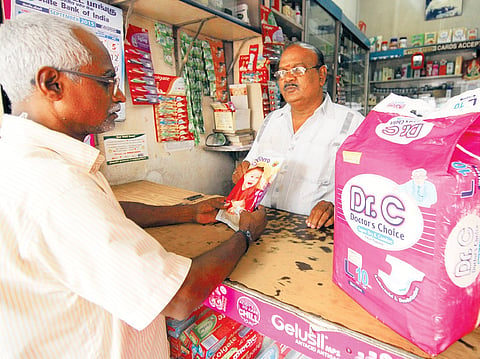

CHENNAI: When Chennai-based Uma, an octogenarian, was diagnosed with Alzheimer’s almost a year ago, her two daughters decided to hire a professional caregiver to take care of her in the night. Since then, the family has availed the services of Vijaya, a trained nurse from ANEW, while during the day, Uma is under the care of their maid.
Vijaya receives close to Rs 10,000 a month for her services to Uma.
Similarly, 74-year-old Raji, whose husband waged a battle against Alzheimer’s for three years, hired the help of two nurses from an agency in Bengaluru, spending close to Rs 25,000 on their services alone.
While Uma is healthy and has only her vitamin supplements and eye drops that work up to Rs 1,000 per month, Raji’s husband, who also suffered from hypertension and diabetes, his medical bills amounted close to Rs 5,000 every month.
Such medical expenses are common among families who have loved ones with Alzheimer’s or Dementia, and some of them spend more than Rs 25,000 on the medical services alone! According to Dr R Sathianathan, vice-chairman, Alzheimer’s and Related Disorders Society of India (ARDSI), “There are professional caregivers available in India. But in most cases, it is one of the family members who become the primary caregivers. This daunting task, eventually takes a toll on their health too. Therefore, the services of a professional caregiver help them to a large extent.”
Alzheimer’s is the most common form of Dementia. With over 4.1 million people in the country living with it, “the total cost of caring for the estimated number totals to Rs 1.23 lakh crore,” adds Dr Sathianathan.
However, ARDSI’s chairperson Meera Pattabiraman points out the hidden costs in many cases. “In most cases, one of the family members gives up his or her job and this adds to the financial burden on the family,” she adds.
For most caregivers, especially for family members, 21-hour surveillance is just one of the many things they do. The other demanding aspect of their role is the constant vigil required over the patient’s food.
As Alzheimer’s comes with memory loss, a patient can forget even basic things like chewing their food. Meera cites the case of Swarna, whose husband choked over a banana and died, while she was in the other room. The food pattern, therefore, has to be changed from solids to semi-solids or liquids, yet it shouldn’t compromise on essential nutrients like proteins and carbohydrates.
While in cases of last stages of Alzheimer’s, feeding tubes are the only resort. “In such situations, there is an ethical dilemma,” avers Meera. “What is the quality of life for the person? Where is the dignity in living through a tube?”
There is also a constant need to look for several other health problems that may go unnoticed. Dr Ravi Samuel, a cognitive behaviour psychotherapist, says that a person with Alzheimer’s doesn’t express his pain or discomfort. “I had a case where the person was extremely aggressive and later it was found that he had suffered a fracture. There was another person who had arthritis, but was unable to express his pain,” he explains, and adds that in such cases, the only thing a caregiver can do is to be extremely patient.
Dr Ravi says that there is a growing need for more professional caregivers. “We need a centralised agency to train caregivers. For a long time, Red Cross in Kerala was sending most of the trained nurses for Alzheimer’s care. But since most of them were women who were unable to relocate, and given the growing need, they couldn’t meet the requirement,” he rues.
ARDSI also runs daycare centres for those with dementia and trains people in care-giving. “You can avail the facility’s services for around Rs 2,500-Rs 5,000 per month. Low prices are the only way to make such services percolate to all levels,” he claims.
(Some names changed to protect identity)